Enneagram Tri-Center 8-4-6: Gut Type 8, Heart Type 4, Head Type 6
The 8-4-6 Tri-Center
-
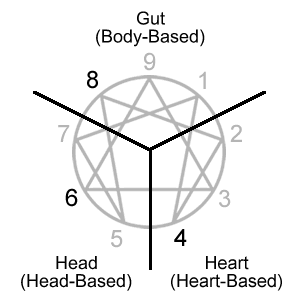
Your tri-center consists of your dominant type in each of the three centers of intelligence with a preferred ordering of the centers (types). The preferred ordering of the 8-4-6 is:
Gut Type: Type 8
-
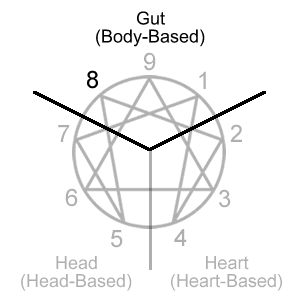
Type 8 is located in the 891 triad which is often described as the gut or body-based center.
There are several ways to interpret what the gut or body types represent. They may be thought of in terms of sensory-somatic (bodily felt sensation), sensory-motor (physical movement and activity), or instinctual (gut decision making).
This may involve taking action based on one's gut instinct, getting pulled along by the agenda of others, and actively trying to correct what's seen as wrong in the world.
Type 8 can be very direct in going after what they want. There's a big energy available that they often have to sit on so that others aren't overwhelmed by it. The desire is to freely express it and be true to it. They often jump into action by making decisions from the gut instead of taking time to carefully think it through. While this gets things moving and makes things happen it can sometimes cause problems or damage that may have to be repaired later.
Type 8 Anger
The anger triad consists of types 8, 9, and 1. Anger for these types involves the gut or body center. It can be thought of as an energy of will that pushes against obstacles to create movement or resists being pushed.
This may involve pushing through obstacles to get what one wants, stubbornly resisting attempts to be pushed in an undesired direction, and getting people to see what's right and correcting things not done right.
Anger for type 8 is an energy readily drawn upon when needed. It's used to push through obstacles and make things happen. Confrontation often comes easy. It clears the air and gets at the truth of things. When the type 8 or others are unfairly taken advantage of it can sometimes come back as a vengeance to get even or rebalance the scales of justice.
To learn more about Enneagram personality type 8 click here.
Heart Type: Type 4
-
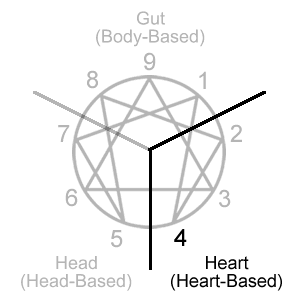
Type 4 is located in the 234 triad which is often described as the heart or heart-based center.
The heart types are focused on interpreting, expressing, and reacting to one’s own emotions or the emotions of others. More specifically, the heart center focuses on what's emotionally significant in the sense that emotions are an indication of how strongly a person resonates with or against something or someone.
This may involve being attentive to the emotional needs and desires of others, seeking emotional affirmation for oneself from others, and expressing one's own unique emotional impression of the world.
Type 4 has emotional impressions of the world which create a rich internal emotional reality. They base their sense of self on this. To express or share this inner emotional world is to share oneself. It can be challenging however to find a way to do this. It can seem like others don't have this same emotional senistivity which can also make the type 4 feel different from other people. This sense of difference can alternate between feeling defective and feeling special.
Type 4 Shame
The shame triad consists of types 2, 3, and 4. Shame for these types involves the heart center. It can be thought of as a feeling of deficiency for not living up to a more idealized sense of self.
This may involve initiating connection with others to avoid feeling unlovable or unimportant in the lives of others, finding value and worth through performance and accomplishment, and finding significance by cultivating and expressing one's uniqueness.
Type 4 shame comes from feeling different from others. It can seem like others are more capable in areas that the type 4 is not. This can sometimes lead to a sense of defectiveness. In compensation, they may search for what makes them uniquely special and try to live from that sense of self instead.
To learn more about Enneagram personality type 4 click here.
Head Type: Type 6
-
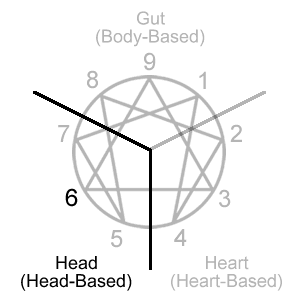
Type 6 is located in the 567 triad which is often described as the head or head-based center.
Although the head types can be thought of in terms of reasoning, analyzing, and other typical thinking functions, a useful distinction from the other two centers can be made in terms of anticipating and preparing for future possibilities.
This may involve gathering data and facts in order to better predict outcomes, preparing for negative potentialities that might occur, and planning or pursuing activities that provide enjoyment and avoid discomfort.
Type 6 thinking often leads to doubts and questioning. This can take place regard one's own thoughts as well as those of others. Some sort of assurance or guidance may be sought in resolving doubts and making decisions. This could come from people, authorities, or systems of thought that over time have shown consistency and been found to be trustworthy and reliable. There can also be a reactionary impulse to jump into action in order to purge any doubts or fears.
Type 6 Fear
The fear triad consists of types 5, 6, and 7. Fear for these types involves the head center. It can be thought of as a negative anticipation of future possibilities and wanting to prepare for or avoid those possibilities.
This may involve learning as much as possible in order to feel competent and knowledgeable, imagining worst-case scenarios and preparing for them, and having alternatives available to avoid being trapped in discomfort or pain.
Type 6 fear can come from imagining worst-case scenarios. This can not only create a cautiousness and seeking of security but also a prepared readiness for the possibility of these scenarios. A general anxiety and sense of doubt about the future and one's own capabilities may be present as well.
To learn more about Enneagram personality type 6 click here.
8-4-6 Tri-Center Focus
-
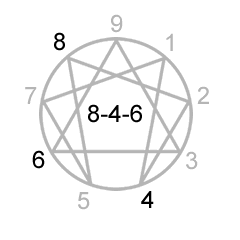
Asserting-Expressing-QuestioningThe tri-center focus looks at your dominant type in each center through the core focus.
-
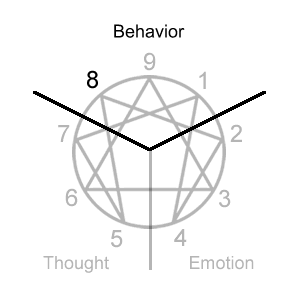
Type 8 Initial Self-Belief: “I am disempowered as I am.”
Type 8 Compensation: "I must be direct in going after what I want and stand strong against being controlled or taken advantage of."
Type 8 Core Focus: Empowerment comes from being in control and not being controlled by people or rules. This requires that I confront obstacles and people that are in my way and move directly toward what I want. Don't show weakness in a world that takes advantage of innocence and vulnerability.
Personality characteristics that might arise from the type 8 core focus:
- Takes action decisively and sometimes impulsively
- Fills up the space around them with their presence and big energy
- Speaks directly and bluntly when making a point
- Often guards against vulnerability by denying softer emotions
- Naturally assumes role of leadership when there's a power vacuum
- Directly confronts others to reveal the truth of a situation
- Protects or seeks justice for those unfairly taken advantage of
- Anger arises in service of making things happen/getting things moving
- Prefers to make their own rules rather than follow others' rules
-
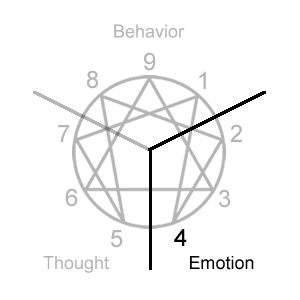
Type 4 Initial Self-Belief: “I am lacking as I am.”
Type 4 Compensation: "I must find and cultivate what's authentic and uniquely special about myself to stand out from the ordinary."
Type 4 Core Focus: Significance comes from cultivating what is unique and emotionally authentic in myself. This requires that I discover and stay true to what has emotional meaning for me and find ways to express that through my own identity and in the world around me.
Personality characteristics that might arise from the type 4 core focus:
- Cultivates and maintains moods they identify with
- Holds in disdain what's common in pursuit of what's special
- Stirs up or intensifies emotional states to feel more alive
- Feels more emotionally sensitive and deeper than others
- Takes things personally even when not intended that way
- Notices what's missing or lacking in self compared to others
- Creates idealized self from what they emotionally resonate with
- Looks for ways to express their inner emotional world
- Wants to deal with internal emotions before moving forward
-
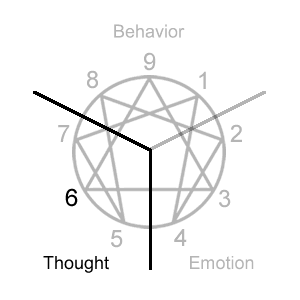
Type 6 Initial Self-Belief: “I am uncertain as I am.”
Type 6 Compensation: "I must search for someone or something that I can depend on that provides the assurance to move forward."
Type 6 Core Focus: Assurance comes from determining what can be trusted so that internal doubts can be resolved. This requires that I find something outside myself that provides support and can be relied upon by questioning the intentions and thoughts of authorities, systems, other people, and even myself.
Personality characteristics that might arise from the type 6 core focus:
- Plays the devil's advocate through contrarian thinking
- Tends to notice what could go wrong in situations
- Mentally prepares for worst-case scenarios
- Becomes suspicious when people behave inconsistently
- Projects imagined thoughts and feelings onto others
- Can be very loyal once someone has earned their trust
- Scans the environment and people for possible threats and danger
- Disarms others through warmth and self-deprecation
- Seeks advice and reassurance when making decisions
Gut Focus: Behavioral Assertiveness
Type 8 - Empowerment through Behavioral Assertiveness
Heart Focus: Emotional Authenticity
Type 4 - Significance through Emotional Authenticity
Head Focus: Mental Questioning
Type 6 - Assurance through Mental Questioning
To learn more about the centers and your center types click on a link below.
Enneagram Tests to Help Determine Centers
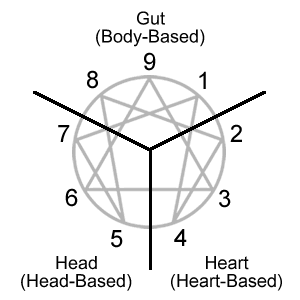
The Enneagram personality types group the nine types into three centers of intelligence often referred to as the gut, heart, and head centers.
These tests help you find your dominant type in each center and the order of preference for those centers.
-
Dominant Type in Each Center with Wings Test
This test determines your dominant type in each center (aka tri-center, trifix, tritype, truetype) along with the wings of those types.
Use when you want to know your tri-center or tri-center with wings. -
Enneagram Type Preference Test
This test produces a scored list of all nine types.
Questions are forced-choice, similar to the method used by the Riso-Hudson Enneagram Type Indictor (RHETI).
Use to determine type, wings, gut/heart/head types, and tri-center. -
Center Type Comparison Test
This test scores the three types in a given center to determine your dominant type within that center (gut, heart, or head type).
Use when you don't know your dominant type for one of the centers. -
Type Comparison Test
This test compares any two types, producing a score for each.
Use when unsure of your tri-center order or which of two types is preferred for a center.
Click here for the Complete Guide to the Enneagram.
This free guide explains- the nine Enneagram personality types
- the many type variations within type
- where the types came from (origins and history)
- how the types use the Enneagram symbol
Click here for Enneagram tests.
These free tests help you find your- primary type
- candidate types
- preferred wing
- intinctual subtype
- instinctual variant stacking
- center types (gut, heart, and head)
- tri-center with wings